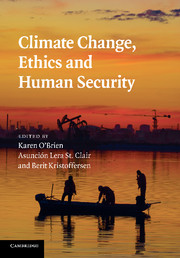Preface
Published online by Cambridge University Press: 01 June 2011
Summary
This book is the result of a European Science Foundation (ESF) Exploratory Workshop on ‘Shifting the Discourse: Climate Change as an Issue of Human Security’, which was held 21–23 June 2007 in Oslo, Norway. This was the same year that the IPCC Fourth Assessment Report was published, and the year that both the IPCC and former US Vice President Al Gore received the Nobel Peace Prize for their work on climate change. Since then, the amount of attention paid to climate change has increased dramatically, particularly in the run-up to the 2009 Conference of the Parties (COP) in Copenhagen, where new international agreements to address climate change will be discussed. Yet, although the connection to peace and security was recognised in 2007 and many more voices and perspectives can now be heard, the discourse itself on climate change has not changed significantly. It is still framed as an environmental problem that can be managed through international agreements for emissions reductions, through market mechanisms for carbon management and through technological advances that will create clean and green societies. Many voices, including some that have long been sceptical about climate change, are now advocating geo-engineering as a solution. The institutionalised, mainstream discourse on climate change has not recognised it as an issue that is first and foremost about the security of individuals and communities and their relationship with the world around them, which includes responsibilities to one another, to other species and to future generations.
- Type
- Chapter
- Information
- Climate Change, Ethics and Human Security , pp. xiii - xivPublisher: Cambridge University PressPrint publication year: 2010



